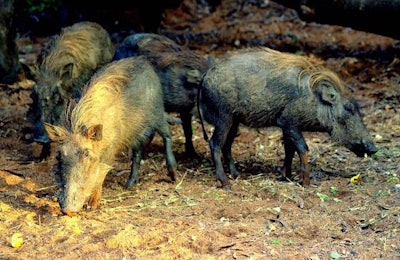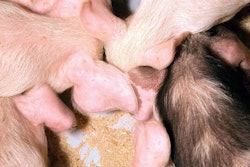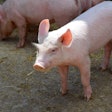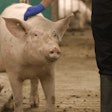
Vietnam’s battle to bring African swine fever (ASF) under control continues, but losses are already estimated at 1.7 million animals. There have been new outbreaks in domestic pigs in China, Poland, Romania, South Africa and Ukraine, and a first outbreak has been reported in the Democratic Republic of Korea.
The agriculture ministry in Vietnam has confirmed to the World Organisation for Animal Health (OIE) a further 55 outbreaks of the disease between March 13 and May 21. These included 17 clusters of outbreaks among herds in close proximity.
Although mainly in the north, the outbreaks have been across the country, and they bring the total number of outbreaks reported to the OIE since February to almost 2,400, with the loss of at least 1.33 million animals as the result of mortality or culling.
The latest ASF update from OIE puts Vietnamese pig losses at more than 1.555 million in reports received over the period May 10-23 alone. According to New Straits Times, 1.7 million pigs have been culled so far in Vietnam — 5% of the country’s pig population.
Compensation at a rate of VND38,000 (US$1.62) per kilogram available to farmers whose animals are culled due to ASF has proven so attractive that many false and exaggerated claims have been made, reports Vietnam News.
The agriculture ministry has tasked local authorities not only to investigate cases of fraud and fine those involved, but also to tighten up their supervision of trade, transport and slaughter of pigs.
As ASF has now spread to the south of the country where most of the commercial-scale pig production is centered, deputy agriculture minister Phung Duc Tien has warned that there could be a pork shortage in the country “in the near future.”
China confirms ASF outbreaks in four regions
ASF has already wiped out as much as 20% of the Chinese hog population, reports South China Morning Post, and the recovery of the sector could take years. As a result of the supply shortage, the Chinese government is forecasting a rise of up to 70% in the price of pork in the second half of the year.
After an absence of three months, ASF has recurred in the southern province of Guizhou, with six dead pigs of a group of 75 animals testing positive for the virus at a slaughterhouse in Guiyang. The authority blamed the infection on the illegal movement of animals.
The disease has also returned to the neighboring province of Yunnan, with outbreaks confirmed in two village herds at Likezhe and Pazhen in different regions. With the combined losses of 184 pigs, these bring Yunnan’s total confirmed ASF outbreaks since February to four.
There have also been new outbreaks in the central provinces of Ningxia and Sichuan during the second week of May. A backyard herd succumbed to the disease in Hebin town in Ningxia, and the Sichuan outbreak was in a village herd of more than 400 animals at Geji.
From the Hong Kong Special Administrative Region, the authorities report no new cases of the disease. This month, tissue samples taken from a batch of “imported” pigs at a slaughterhouse tested positive for the ASF virus. Once this result was made public, the facility was immediately closed for disinfection, and it reopened nine days later.
A new team has recently been set up by the Chinese Academy of Agricultural Sciences, tasked with developing a vaccine to control ASF, reported Xinhua last week.
North Korea records first ASF outbreak
ASF has been confirmed for the first time in the Democratic Republic of Korea. According to the official report to the OIE, 77 pigs of a village herd of 99 animals died this month at Buksang cooperative farm in the province of Chagang, which borders China.
The presence of the ASF virus has been confirmed, but the source of infection is unknown.
South Africa confirms fourth outbreak
ASF has been detected at a second farm in the province of Gauteng, according to the agriculture ministry’s latest report to the OIE. Affected was a farm with 98 pigs, two of which are known to have died of the disease.
Previous outbreaks were recorded in the regions of Mpumalanga and Free State, and all cases so far have occurred outside South Africa’s ASF Control Zone, reports the ministry.
Philippines widens ban on pork product imports
To minimize the risk of introducing the ASF virus to the country, Manila Bulletin reports that The Philippines has banned imports of pig meat from a further nine countries — Belgium, Bulgaria, Cambodia, the Czech Republic, Moldova, Mongolia, South Africa, Vietnam and Zambia.
Already last year, the Department of Agriculture initiated similar restrictions on pork product trade with China, Hungary, Latvia, Poland, Romania, Russia and Ukraine.
Seven European countries report more ASF in wild boar
ASF continues to afflict the wild boar populations of several European countries.
Based on reports received by the OIE over the past two weeks, worst affected was Poland, where 68 animals were lost to the disease through mortality or culling at different locations in the province of Warmia-Masuria, followed by Romania (65), Hungary (52), Latvia (9), Belgium (7), Moldova (6) and Russia (2).
ASF hits further central, eastern European domestic pigs
Over the past two weeks, the ASF virus has also been reported in domestic pigs in Poland, Romania and Ukraine.
Poland’s agriculture ministry has reported just one new outbreak to the OIE. Two pigs died among a herd of more than 1,700 at a farm in Warmia-Masuria in mid-May. Although numerous Polish wild boar have succumbed to ASF in this and neighboring provinces, this is only the second outbreak in domestic pigs in the country this year.
Romania’s national veterinary authority has informed the OIE about a further 13 recent outbreaks of ASF in domestic pigs, all in backyard herds in the south and southeast of the country. A total of 155 animals were lost to the disease as a result of mortality or culling.
There has been a second outbreak of ASF in the region of Vinnitsa in southern Ukraine, according to the latest notification to the OIE from the national veterinary agency. This follows one month after the previous cases, and affected a farm with almost 1,100 pigs.
After just one outbreak in a backyard herd in mid-March, the animal health authority of Moldova has declared to the OIE that the ASF disease situation in the country’s pork industry has been “resolved.”
View our continuing coverage of the African swine fever outbreak.

















